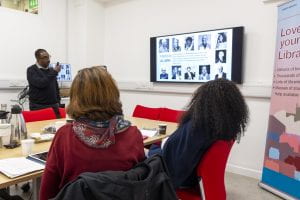HE Libraries in South Africa
By simon.bralee.15, on 9 December 2019
Three Librarians from the University of the Witwatersrand, Johannesburg (Wits) gave a talk to UCL Library Services staff on the Higher Education sector in South Africa.
Salome Potgieter, Kedibone Ivory Moagi and Devind Donald Peter came to UCL in November 2019 following a visit of a delegation led by the Vice-Provost (Global Engagement) in 2018. The talk was an opportunity for them to share their experiences and learn from UCL Library staff about practical projects that could take the Library and the Wits user community forward.
Higher Education in South Africa
There are 26 universities in South Africa, split into Traditional Universities, Comprehensive Universities (vocational) and Universities of Technology. It is a massive sector with a student population of around million (compared to 2.3 million in the UK). Since the end of Apartheid in 1994, the student population has doubled. The number of black students has grown to more than 80% of the student body and women represent approximately 55% of enrolments.
The sector faces challenges including escalating costs, a Fees Must Fall campaign and calls to decolonise education and remove symbols of the apartheid past.
Wits University
The University of the Witwatersrand is called Wits for short (pronounced Vits) and students are called Witsies. It is one of the oldest universities in South Africa, founded in 1896 and given university status in 1922. There are five faculties spread over three campuses. It is one of the best universities in Africa, ranked first in Africa (Academic Rankings of World Universities 2018) and in the top 400 universities in the world. There are around 38,000 students in total with 17% postgraduate level.
Wits is focused on research impact. It competes globally and acts locally. One area they explore this is in the Tshimologong (“New Beginnings”) Techknowledgy Factory which is often described as South Africa’s Silicon Valley. Wits supports #4IRSA – the Fourth Industrial Revolution in South Africa – an initiative developing the country’s digital technology sector through collaboration between academics, industry and government. A notable project was the “Brainternet” project, which streamed brainwaves onto the internet. Researchers from the Wits Donald Gordon Medical Centre also developed the first successful liver transplant from a mother living with HIV to her critically ill HIV negative child. Both mother and child survived and thrived. Open Access research is held on Wired Space online repository.
Witsies have the Wits Edge. There are many notable alumni, including several Nobel laureates one of whom was Nelson Mandela. It also home to Bidvest Wits Football Club – the Clever Boys- one of South Africa’s finest football teams.
Wits Libraries
Like UCL, Wits operates on a decentralised model. There are 11 libraries over three main campuses. The Wartenweiler Main Library and William Cullen Library are housed on East Campus along with the Architecture Library, Biophy Library and GeoMaths Library; Commerce, Engineering, Law Libraries are housed on West Campus; and the Management Library, Wits Health Science Library and Education Library are housed on the Parktown Campus.
There are many similarities between us and Wits. They receive over 2,500,000 visits per year (compared to an estimated 5 million at UCL in 2019-2020). Like most universities they find that users are using more online resources and they have noticed a decrease in the use of physical book stock.
The service is currently undertaking a Library Skills audit and are exploring systems to support this such as LibGuides. Currently some courses like Health Sciences and Commerce, Law & Management have Information Literacy embedded in the curriculum. Info-lit is also part of the “Road to Success Program” for first year Engineering & the Built Environment undergrads.
Alongside this, the Library team are involved in a Reimagining of Library Spaces project which aims to improve the user experience with digital technologies. As part of this process, Wits Library have created a new Learning and Innovation Centre, which is open 24 hours. The space will enable face-to-face engagement with groups of academics, researchers and students with flexibility to turn into a space for independent individual or group work. They have also created a Focus Room which includes Kapp boards (digital flipcharts), Video recording equipment and Nintendo switch, Xbox and PS4 consoles and on top of the usual laptops and large screens.
The library receive feedback from their users through the normal channels including liaison committees. They also use Facebook and Twitter to engage with their users.
For more information, please read the slideshow from the talk.
 Close
Close


